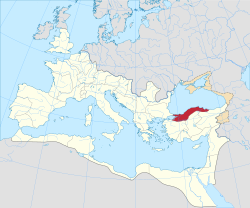Bithynia and Pontus
|
Provincia Bithynia et Pontus Επαρχία Βιθυνίας και Πόντου |
|||||
| Province of the Roman Empire | |||||
|
|||||
| The province of Bithynia et Pontus within the Roman Empire, ca. 125 AD | |||||
| Capital | Nicomedia | ||||
| Historical era | Antiquity | ||||
| • | Bithynia and Pontus annexed | 74 BC/64 BC | |||
| • | Byzantine reorganization | 7th Century | |||
| Today part of |
|
||||
Bithynia and Pontus (Latin: Provincia Bithynia et Pontus) was the name of a province of the Roman Empire on the Black Sea coast of Anatolia (Turkey). It was formed by the amalgamation of the former kingdoms of Bithynia (annexed by Rome 74 BC) and Pontus (annexed 63 BC).
The province of "Bithynia and Pontus" was originally two separate kingdoms, among the several successor kingdoms of Alexander the Great's empire.
The Kingdom of Bithynia first achieved Independence from the larger Hellenistic kingdoms in 297 BC under its first king Zipoetes I of Bithynia. Under king Prusias I, Bithynia first came into contact with the Roman Republic. Bithynia remained neutral during Rome's war against the Seleucid Empire and its King Antiochus the Great from 192-188 BC, despite the Seleucid Empire being the long-time enemy of the kingdom.
Prusias I's son and successor, Prusias II of Bithynia, first opened relations with Rome. Following Prusias II's failed invasion of the Roman ally of the Kingdom of Pergamon in 154 BC, Bithynia was forced to pay heavy war reparations. Prusias II sent his son Nicomedes II of Bithynia to Rome to negotiate a reduction in the annual payments. Once in Rome, Nicomedes II gained the favor of the Roman Senate and, following a failed assassination attempt on Nicomedes II's life by his father Prusias II, the Senate supported Nicomedes II in his revolt against his father. Supported by Rome and Pergamon king Attalus II Philadelphus, Nicomedes II overthrew his father and became king in 149 BC and entered into an alliance with Rome.
...
Wikipedia

